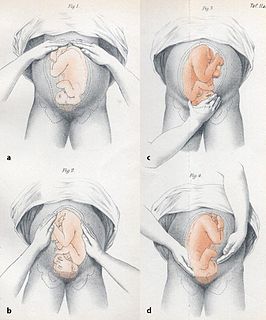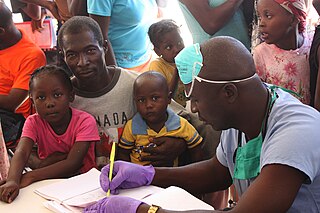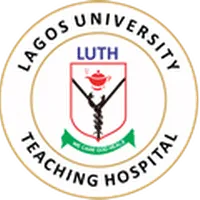
Obstetrics and Gynaecology is the medical specialty that encompasses the two subspecialties of obstetrics and gynecology.

The Mayo Clinic is a nonprofit American academic medical center focused on integrated health care, education, and research. It employs over 4,500 physicians and scientists, along with another 58,400 administrative and allied health staff, across three major campuses: Rochester, Minnesota; Jacksonville, Florida; and Phoenix/Scottsdale, Arizona. The practice specializes in treating difficult cases through tertiary care and destination medicine. It is home to the top-15 ranked Mayo Clinic Alix School of Medicine in addition to many of the highest regarded residency education programs in the United States. It spends over $660 million a year on research and has more than 3,000 full-time research personnel.

Baylor College of Medicine (BCM) is a private, independent health sciences center in Houston, Texas within the Texas Medical Center, the world's largest medical center. BCM is composed of four academic components: the School of Medicine, the Graduate School of Biomedical Sciences; the School of Health Professions, and the National School of Tropical Medicine.

The Indiana University School of Medicine (IUSM) is a major multi-campus medical school in the state of Indiana. There are nine campuses throughout the state; the principal research and medical center is located on the Indiana University–Purdue University Indianapolis campus in Indianapolis. With 1,409 M.D. Program students and 158 Ph.D. students in 2017, IUSM is one of the largest medical schools in the United States. The school offers several joint-degree programs, including an MD/MBA, MD/MA, MD/MPH, MD/MS, MD/JD, and an MD-PhD Medical Scientist Training Program. The university is the American medical school with the largest number of physicians in the United States per the 2018 Federation of State Medical Boards Survey with 11,828 licensed physicians.

A clinic is a health facility that is primarily focused on the care of outpatients. Clinics can be privately operated or publicly managed and funded. They typically cover the primary care needs of populations in local communities, in contrast to larger hospitals which offer more specialised treatments and admit inpatients for overnight stays.

Partners In Health (PIH) is an international nonprofit public health organization founded in 1987 by Paul Farmer, Ophelia Dahl, Thomas J. White, Todd McCormack, and Jim Yong Kim.

SUNY Downstate Health Sciences University (Downstate) is a public medical school and hospital in Brooklyn, New York. It is the southernmost member of the State University of New York (SUNY) system and the only academic medical center for health education, research, and patient care serving Brooklyn's 2.5 million residents. As of Fall 2018, it had a total student body of 1,846 and approximately 8,000 faculty and staff.

Vancouver General Hospital is a medical facility located in Vancouver, British Columbia. It is the largest facility in the Vancouver Hospital and Health Sciences Centre (VHHSC) group of medical facilities. VGH is Canada's third largest hospital by bed count, after Hamilton General Hospital, and Foothills Medical Centre.

The Cuban government operates a national health system and assumes fiscal and administrative responsibility for the health care of all its citizens. There are no private hospitals or clinics as all health services are government-run. The present public health minister is Roberto Morales Ojeda.

OpenMRS is a collaborative open-source project to develop software to support the delivery of health care in developing countries.
HIV/AIDS in Eswatini was first reported in 1986 but has since reached epidemic proportions. As of 2016, Eswatini had the highest prevalence of HIV among adults aged 15 to 49 in the world (27.2%).

University General Hospital of Patras , is a public general Hospital located next to the University of Patras in Rio, Greece, just few kilometers away from the city of Patras.The construction of the hospital was completed in 1988 and a few months later it began operation. It is part of the ESY, the National Healthcare System of Greece. It was renamed General University Hospital of Patras - All Holy Theotokos the Helper in July 2009.

The University of Florida College of Medicine – Jacksonville is the largest of the three University of Florida Health Science Center Jacksonville colleges — medicine, nursing and pharmacy. The college's 16 clinical science departments house more than 440 faculty members and 380 residents and fellows. The college offers 34 accredited graduate medical education programs and 10 non-standard programs.

The Wai‘anae Coast Comprehensive Health Center (WCCHC), founded in 1972, is a community health center serving the healthcare needs of the Wai‘anae Coast on the west side of O‘ahu, in the U.S. state of Hawaii. When it was first established, WCCHC had just one doctor and five staff members. Now celebrating its 40th year in business, WCCHC proudly employees 540 employees who span the main center in Wai‘anae and four satellite clinics in surrounding areas, including Kapolei and Waipahu.

The Institute for Family Health is a not-for-profit health organization. Founded in 1983, the Institute is one of the largest community health centers in New York State. It serves over 85,000 patients annually at 31 locations in the Bronx, Manhattan and the mid-Hudson Valley. The Institute is a federally qualified health center (FQHC) network. Like all Community Health Centers, the Institute accepts all patients regardless of their ability to pay and is governed by a board that has a majority of health center patients. The Institute offers primary care, mental health, dental care, and social work, among other services. The Institute is accredited by the Joint Commission and recognized by the National Committee for Quality Assurance as a Level 3 patient-centered medical home. The Institute also leads programs and conducts research to address racial and ethnic disparities in health, advance the use of health information technology, and improve care for diabetes, depression, women’s health, and HIV. The Institute trains health students and professionals at all levels, including the operation of three family medicine residency programs: the Beth Israel Residency Program in Urban Family Practice, the Mid-Hudson Residency in Family Practice and the Harlem Residency in Family Medicine. It is also a major regional clinical campus for clinical rotations affiliated with the New York Institute of Technology College of Osteopathic Medicine.

Lagos University Teaching Hospital (LUTH) is a tertiary hospital established in 1961 and is located in Idi-Araba, Surulere, Lagos State, the administrative division of Nigeria. The teaching hospital affiliated with the University of Lagos College of Medicine established in 1962. The University of Lagos College of Medicine educates students and LUTH provides them with experience through placement and work experience.

PharmAccess Foundation is a part of the PharmAccess Group. PharmAccess is an international non-profit organization with a digital agenda dedicated to connecting more people in sub-Saharan Africa to better healthcare. By making use of public-private partnerships, they leverage donor contributions, which they believe will pave the way for private investments hereby contributing to healthier populations and social and economic development. Currently PharmAccess employs a multidisciplinary team of professionals in Tanzania, Kenya, Nigeria, Ghana and the Netherlands.

Voluntary Health Services, popularly known as the VHS Hospital, is a multispecialty tertiary care referral hospital in the south Indian state of Tamil Nadu, reportedly serving the economically weaker sections of the society. It was founded in 1958 by Krishnaswami Srinivas Sanjivi, an Indian physician, social worker and a winner of Padma Shri and Padma Bhushan awards and is run by a charitable non governmental organization of the same name. The hospital is situated along Rajiv Gandhi Salai at Taramani, in Chennai.
Dr Eugen Molodysky OAM, MMBS is an academic and medical practitioner in preventive medicine and translational research. His research has been published in peer reviewed journals over the last 30 years. He has a life-long professional focus on prevention, preclinical diagnosis and early intervention.

The Catholic Medical Mission Board (CMMB) is an international, faith-based NGO, providing long-term, co-operative medical and development aid to communities affected by poverty and healthcare issues. It was established in 1912 and officially registered in 1928. CMMB is headquartered in New York City, USA, and currently has country offices in Haiti, Kenya, Peru, South Sudan, and Zambia.


















